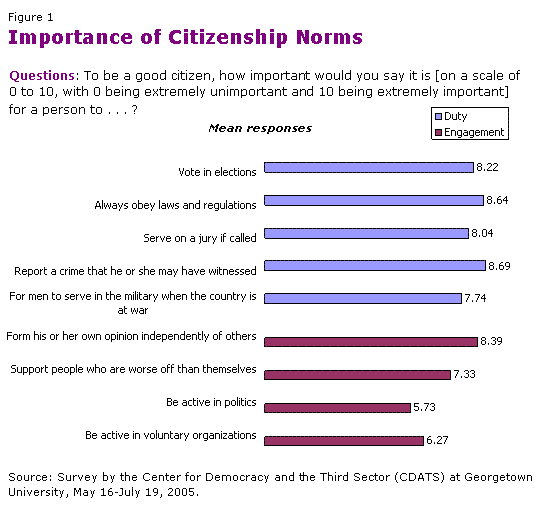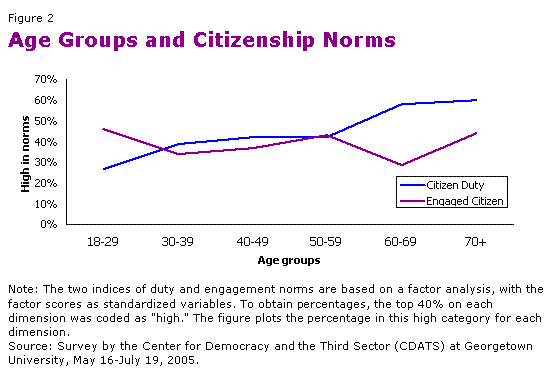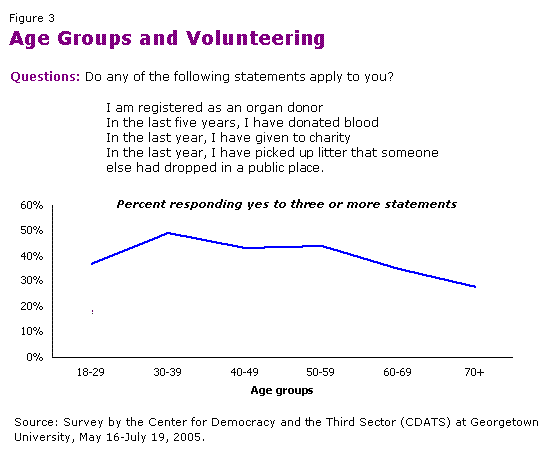What’s the Matter with Kids Today?
Kids! I don't know what's wrong with these kids today
Kids! Who can understand anything they say?...
You might remember these lyrics from a popular song. The song’s refrain—“Why can’t they be like we were, perfect in every way?/ What’s the matter with kids today?”—seemingly guides those political analysts who attribute many of the supposed ills of American democracy to the young.
On the one hand, a variety of authors—from Tom Brokaw to Bob Putnam—extol the civic values and engagement of the older, “greatest generation” of Americans with great hyperbole. On the other hand, there is an apparently equal disdain for the young, who are described as the “doofus generation” or the “invisible generation,” even by journalists who are members of Generation X. For instance, William Damon has recently stated that
Young people across the world have been disengaging from civic and political activities to a degree unimaginable a mere generation ago. The lack of interest is greatest in mature democracies, but it is evident even in many emerging or troubled ones. Today there are no leaders, no causes, no legacy of past trials or accomplishments that inspire much more than apathy or cynicism from the young.
In his influential book, Bowling Alone, Robert Putnam holds that the slow, steady, and ineluctable replacement of older civic generations by baby boomers, and especially generations X and Y, is the most important reason for the erosion of social capital. A recent study by the American Political Science Association claims that “Democracy is at Risk,” and the young are the source of this angst. Perhaps not since Aristotle held that “political science is not a proper study for the young,” have youth been so roundly criticized by their elders.
Are American youth really this bad? Young people seem disengaged with voting turnout, and alienated from electoral politics—but so, too, are many older Americans. Moreover, other evidence points to increases in other forms of political action among the young. In addition, a variety of causes still motivate the young, such as the initiatives to address poverty in Africa (and America) or improve the global (and American) environment. Thus, there is counterevidence that young Americans are changing their style of political action rather than dropping out of politics entirely. And, in other domains, younger Americans may display traits that are positive for democracy and society—but lacking among their elders.
Here we explore these contrasting ideas by summarizing some initial findings from a new national public opinion survey by the Center for Democracy and the Third Sector (CDATS) at Georgetown University that probed into the patterns of citizenship among Americans. The survey conducted in-person interviews with 1,001 respondents between May 16 and July 19, 2005. Some of our findings contradict the dire claims that American democracy is at risk because of its youth. The young think differently from their elders, and act differently—but different does not always hold negative implications for our nation.
Implicit in the above arguments of generational change is the claim that the norms of citizenship are changing across the generations, producing different patterns of participation and other behavioral consequences. Older Americans typically castigate the young for not being like them, and attribute negative political developments to the eroding values and poor behavior of the young. The fact that the young may not think of citizenship in the same terms as their elders is presented as evidence that they lack desirable citizenship norms.
To probe how Americans think about citizenship, CDATS asked respondents to evaluate the importance of ten potential norms to being a good citizen. Our analyses of these items identified two distinct patterns of citizenship:
- Citizenship as duty involves norms of social order—serving on a jury, obeying the law, serving in the military, and reporting a crime—and the duty of voting. This is the classic model of a citizen-subject that is well known in the political culture literature.
- Engaged citizenship includes concern for the well-being of others, forming one’s own opinion, and two participation examples: being active in civil society groups and general political activity. The engaged citizen appears willing to act on his or her principles, be politically independent, and address social needs.
While these two sets of norms are not contradictory, and all were cited as important by most Americans (see Figure 1), they reflect contrasting emphases in the role of a democratic citizen. There are two faces of citizenship in America, with distinctly different emphases of what it means to be a good citizen.
As we might expect, the CDATS survey showed a clear shift in distribution of citizenship norms across age groups (see Figure 2). Older Americans who are part of the World War II and the postwar boomer generation scored highest on citizen duty. These individuals thought of citizenship in terms of their duty to vote in elections, to follow the laws, and to support the social order. Such sentiments steadily weakened among the 1960s generation and Gen X and Gen Y. Expressed in other terms, the findings indicated a strong positive relationship between age and duty-based citizenship. This is the pattern that analysts typically discuss, leading to negative commentaries on how a declining sense of duty among the young is eroding the foundations of democracy.
At the same time, Figure 2 shows that the erosion of duty-based norms was counterbalanced by greater support for norms of engaged citizenship among the young, with responses demonstrating a weak negative correlation between age and these norms. A concern for others, independent thinking, and engaging in nonelectoral politics are hardly undemocratic or un-American values—although few analysts write about the lack of such values among older Americans.
This figure displays a simple truth. Claims about the decline in citizenship values among younger Americans are incorrect. Rather, the survey showed a generational shift in the types of citizenship norms that Americans stress. Those socialized before and immediately after World War II were more likely to define citizenship in terms of duties and obligations. Indeed, one might argue that these are the norms of a good subject (though not necessarily a good democratic participant) in the terms of Gabriel A. Almond and Sidney Verba’s classic concept in The Civic Culture. They would lead one to vote out of a sense of duty, to feel a duty to obey the law, and to be somewhat deferential to elites. In contrast, young respondents reflected a new political reality, and stressed alternative norms that should encourage a more rights-conscious and socially engaged public, and a more deliberative image of citizenship. Both norms hold positive (and negative) implications for the practice of citizenship and the workings of the democratic process.
One of the primary grounds for this generational debate involves the changing levels of political participation in America. Typically, young Americans are cited as a primary source of decreasing turnout in elections, and this is generalized to a supposed disdain for all of politics.
Comparing age differences in participation groups provides evidence of whether generational change is eroding the participatory tradition of Americans. As a baseline model, we should expect increasing political involvement with age, as individuals assume more family and career responsibilities and become integrated into their political communities. This is generally known as the “lifecycle model” of political participation. So, all else being equal, older Americans are expected to be more politically active. The recent criticism of young Americans claims, however, that a generational effect has dropped their engagement to a lower baseline, so that overall participation rates have decreased.
The 2005 CDATS/CIDS survey is well-positioned to examine the full repertoire of political action because it measures participation for fourteen different political activities. The survey asked respondents whether they had performed each activity in the previous twelve months, which overlapped with the 2004 national elections. For participation in voting and campaigns, lifecycle patterns and generational differences in citizenship norms appeared to be reinforcing. Older voters were more engrained in voting as a duty, while the young were critical of partisan politics and less duty-oriented. Consequently, there was a strong positive relationship between age and voting, and for donating money, working for a political party or campaign, or displaying a campaign badge or bumper sticker. These are the participation patterns that lead analysts to castigate the young for their limited engagement, and to argue that the limited campaign involvement of the young bodes ill for the future.
An exclusive focus on participation in voting and campaigns is, however, a very traditional and highly restrictive definition of political action. The modern citizen can use a broad repertoire of political activities, such as forms of protest, direct action, and collective activity. A generational shift toward norms of engaged citizenship should reinforce new, nonvoting participation among the young.
Our analyses found that for many of these nonelectoral forms of action, the participation of the young was so common that it reversed the normal lifecycle pattern. Young respondents were more active in buying products for political reasons, attending legal demonstrations, visiting political websites, and participating in internet-based political actions. These new forms of political action are the domains of the young, and the lifecycle model implies that these activities may even increase further as Gen-Xers age. In summary, it is too simple to claim that the young are politically inactive—they are active, albeit in different ways.
We should not ignore the lower voting turnout rates of young Americans, because when they stay home from the polls, this limits their influence in the political process and may even shift electoral outcomes. But rather than declining electoral participation signaling a broad decline in political engagement among the young, the changing norms of citizenship are shifting political participation to other forms of action. And, if reformers want to reengage the young in electoral politics, they should realize that their alienation from party politics and changing norms of citizenship—rather than their lack of political interest—is the source of declining turnout.
The Los Angeles Times recently began an article on the annual UCLA survey of college freshmen with a story of a California university student who spent his fall break as a volunteer helping to salvage homes flooded by Hurricane Katrina. He organized a group with other student volunteers to give up their break to do hard labor in a devastated region. The message of the article was that volunteering in 2005 was at its highest percentage in the twenty-five years of the UCLA college survey.
This experience stands in marked contrast to the recent drumbeat of negativity about the involvement of young Americans beyond the political arena. We are told by political scientists and presidents that young Americans are not “good citizens” as they once were, and more civic engagement and citizenship is needed. Even the increase in protest, direct action, and internet activity among the young that we have just described is sometimes cited as part of the individualist drift in the American political culture, where civic community and the willingness to work with others are lacking.
To test the civic spirit of Americans, the CDATS survey asked four questions about voluntarism:
• Are you registered as an organ donor?
• Have you donated blood in the last five years?
• Have you given to charity in the last year?
• Have you picked up someone else’s litter in the last year?
Ironically, Figure 3 shows that younger Americans are more likely to engage in these various forms of civic volunteering than their elders.
This may be a reflection of the increased emphasis on volunteering as part of civic education in high schools, but it also reflects greater adherence to the norms of engaged citizenship among the young. Volunteering dropped off for survey respondents under thirty—possibly a reflection their lifestyle stage, where giving to charity or donating blood was not yet established for age reasons. But from thirty years on, volunteering steadily decreased. The greatest generation apparently does not give blood or pick up litter.
In conclusion, many contemporary experts apparently look back to the 1950s as a golden age of American politics and want to renew an image of citizenship and participation identified with this era. Young Americans are routinely criticized because they do not share this vision, and thus do not act as their elders do.
We argue that this retrospective definition of citizenship is too narrow—and probably seeks to revive an age that was not so golden. A retrospective view focusing on the positive aspects of traditional norms ignores the potential negative elements of these norms and the potential gains from other definitions of citizenship. Young Americans are committed to good citizenship, but their commitment is to a model of citizenship substantially different from the norms of their parents and grandparents. Other analyses from the CDATS survey indicate that these new norms of citizenship stimulate positive benefits for democracy and society that analysts have overlooked in their praise of duty-based citizenship: expanding repertoires of political action, more voluntarism, greater political tolerance, and a stronger commitment to civil liberties and democratic values. Indeed, instead of humming the tune to the song described at the beginning of this article, young Americans might be thinking of another lyric to share with their elders: “Teach your parents well . . . ”
Russell J. Dalton is professor of political science at the University of California, Irvine.
Citizenship Norms and Political Participation in America: Text of original study.
Additional reading
Damon, William. 2001. To not fade away: Restoring civil identity among the young. In Making good citizens: Education and civil society, ed. Diane Ravitch and Joseph Viteritti. New Haven: Yale University Press, 2001
Macedo, Stephen, ed. 2005. Democracy at risk: How political choices undermine citizen participation, and what we can do about it. Washington, DC: Brookings Institution Press.
Putnam, Robert. 2000. Bowling alone: The collapse and renewal of American community. New York: Simon and Schuster.
Zukin, Cliff, Scott Keeter, Moly Andolina, Krista Jenkins, and Michael X. Delli Carpini. 2006. A new engagement? Political participation, civic life, and the changing American citizen. New York: Oxford University Press.


